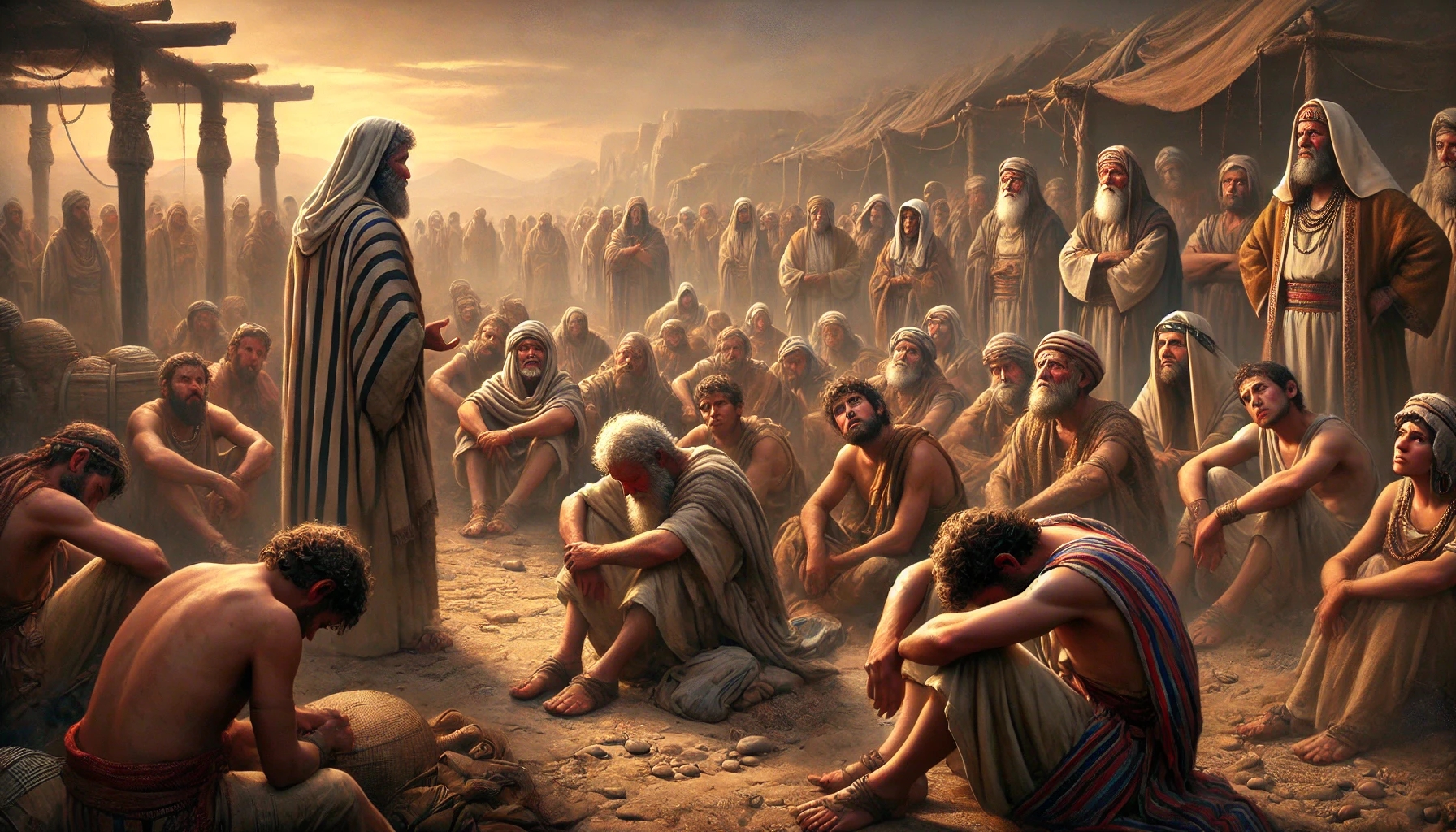 July 17, 2025
July 17, 2025
 The Discipline of the Tongue
The Discipline of the Tongue
 Speak so that life grows – not fades
Speak so that life grows – not fades
────────────────  ────────────────
────────────────
 Bible Verse
Bible Verse
“Let no corrupt communication proceed out of your mouth, but that which is good to the use of edifying, that it may minister grace unto the hearers.” – Ephesians 4:29 (KJV)
────────────────  ────────────────
────────────────
 Introduction
Introduction
Do you know the feeling when a single sentence can hurt more than a slap in the face? A careless or angry word can cut deeper than any sword. At the same time, a loving word can heal, build up, and give hope. In Ephesians 4:29, Paul calls us to think about our words – not superficially, but deeply: “Let no corrupt word”, he says – nothing that tears down, wounds, or is empty. Instead, we are to speak “what is good for edification.”
Today’s topic: The Discipline of the Tongue. Words are not just sounds. They have power. They can bring life – or destruction.
────────────────  ────────────────
────────────────
 Devotional
Devotional
Our language – our tongue – is like a tool. And like every tool, it depends on how we use it.
Ellen White writes:
“Words possess a power that can reach from time into eternity. They can bring blessing or curse, life or death.”
(Christ’s Object Lessons, p. 337)
What does this mean in practice? Paul urges us to speak only words that build up, encourage, and bring grace. It’s not just about being polite. It’s about a heart attitude that is mindful of how we treat people – especially through our speech.
Because our tongue reveals what is in our heart:
“Out of the abundance of the heart the mouth speaks.” – Luke 6:45
If our heart is full of bitterness, anger, or pride – our words will reflect that. But if it’s filled with God’s love, mercy, and truth – our words will heal, strengthen, and give life.
Ellen White adds:
“We should speak in such a way that our words reflect what Christ has worked in us. The world should taste the love of heaven through our tongue.”
(The Adventist Home, p. 435)
So the discipline of the tongue begins in the heart – in prayer, in self-reflection, and in the desire to reflect God’s grace.
────────────────  ────────────────
────────────────
 Story: “The Feathers in the Wind”
Story: “The Feathers in the Wind”
In a small Romanian village lived a boy named Alex, who loved to talk – loudly, quickly, sometimes carelessly. One day he spread a rumor about his classmate Raul. It wasn’t completely false, but it wasn’t true either. Raul was laughed at, shunned, and didn’t come to school for days.
When Alex saw what his words had caused, he felt guilty. He went to the village priest and asked for advice. The priest listened silently, then brought an old pillow, cut it open, and said:
“Go up the hill and scatter these feathers into the wind. Then come back.”
Alex did it. When he returned, the priest said:
“Good. Now – go gather them all back.”
“That’s impossible!”, cried Alex.
The priest nodded: “So it is with your words. Once they are spoken, you can’t take them back.”
Alex understood. From that day on, he began to think before he spoke. He tried to choose words that healed – not harmed.
────────────────  ────────────────
────────────────
 Reflection – What does Ephesians 4:29 mean to you?
Reflection – What does Ephesians 4:29 mean to you?
-
What “feathers” have you perhaps already thrown into the wind?
-
What words have deeply hurt – or deeply built you up?
-
If people spoke about your words today – would they say: “Grace flows from their lips”?
Ephesians 4:29 is not just a language course. It is an invitation to speak healing language – the language of the Kingdom of God.
────────────────  ────────────────
────────────────
 Today’s Reflections
Today’s Reflections
-
 Say at least one encouraging sentence to someone who doesn’t expect it.
Say at least one encouraging sentence to someone who doesn’t expect it. -
 Pause before speaking. Ask yourself: Will what I say build up or tear down?
Pause before speaking. Ask yourself: Will what I say build up or tear down? -
 Memorize Ephesians 4:29. Let it become your inner filter.
Memorize Ephesians 4:29. Let it become your inner filter. -
 Keep a “speech journal” for one week: Note when you consciously spoke positively – or when you should have.
Keep a “speech journal” for one week: Note when you consciously spoke positively – or when you should have.
────────────────  ────────────────
────────────────
 Prayer
Prayer
Father in heaven,
You gave us the ability to speak – help us to use it for Your glory.
Forgive us where our words have hurt instead of healed.
Give us a pure heart so that our tongue also gives grace.
Discipline our speech through Your Holy Spirit – and teach us to speak as Jesus spoke.
Amen.
────────────────  ────────────────
────────────────
 Takeaway
Takeaway
“My words are either windows of grace – or walls of pride. I decide.”
Source: https://fulfilleddesire.net/17-07-2025-the-discipline-of-the-tongue-heart-anchor-youth-devotional/

 Lesson 3: Rough Start
Lesson 3: Rough Start 3.4 Uncircumcised Lips
3.4 Uncircumcised Lips When discouragement closes ears – God’s promise still stands
When discouragement closes ears – God’s promise still stands Introduction
Introduction Bible Study – Exodus 6:9–13
Bible Study – Exodus 6:9–13 1. Context: Moses at a low point
1. Context: Moses at a low point Important Point:
Important Point: Deepening & Parallels
Deepening & Parallels Job
Job Spiritual Principles from this passage
Spiritual Principles from this passage Application in Life
Application in Life Practical Application
Practical Application Conclusion
Conclusion Thought of the Day
Thought of the Day The Message of Leviticus (3rd Book of Moses)
The Message of Leviticus (3rd Book of Moses) Central Message
Central Message What is the Book of Leviticus about?
What is the Book of Leviticus about? Why is Leviticus still important today?
Why is Leviticus still important today? What does Leviticus say to you personally?
What does Leviticus say to you personally? ~~~~~
~~~~~ July 16, 2025
July 16, 2025 Leviticus 1 – An Offering Pleasing to God
Leviticus 1 – An Offering Pleasing to God Bible Text – Leviticus 1 (KJV)
Bible Text – Leviticus 1 (KJV) Introduction
Introduction Commentary
Commentary Place of Encounter: The Tent of Meeting (Verse 1)
Place of Encounter: The Tent of Meeting (Verse 1) The Voluntary Offering (Verses 2–3)
The Voluntary Offering (Verses 2–3) Laying the Hand on the Offering (Verse 4)
Laying the Hand on the Offering (Verse 4) Other Animals: Sheep, Goats, Birds (Verses 10–17)
Other Animals: Sheep, Goats, Birds (Verses 10–17) Order and Purity
Order and Purity Summary
Summary Message for Us Today
Message for Us Today Am I willing to offer myself as a living sacrifice?
Am I willing to offer myself as a living sacrifice? Maybe it’s time to give the Lord not just a part, but everything.
Maybe it’s time to give the Lord not just a part, but everything.
 July 13 – 19, 2025
July 13 – 19, 2025 1. Jacob flees – alone, afraid, and broken
1. Jacob flees – alone, afraid, and broken Reflection Question
Reflection Question 16.07.2025
16.07.2025 The Gift of Words
The Gift of Words Words that Build or Destroy Life
Words that Build or Destroy Life ────────────────
──────────────── Bible Verse
Bible Verse Introduction
Introduction How do we actually use this gift?
How do we actually use this gift? Devotional
Devotional So what does it mean to keep your tongue?
So what does it mean to keep your tongue? Story – The Scars of the Nails
Story – The Scars of the Nails What can we learn from this story?
What can we learn from this story? Reflection – What does this mean for you?
Reflection – What does this mean for you? Today’s Reflections
Today’s Reflections Prayer
Prayer Takeaway Thought for Today
Takeaway Thought for Today
 Lesson 3: Rough Start
Lesson 3: Rough Start 3.3 The Divine “I”
3.3 The Divine “I” Despair meets promise – when God answers our complaint
Despair meets promise – when God answers our complaint Introduction
Introduction Bible Study: Exodus 5:22–6:8
Bible Study: Exodus 5:22–6:8 Context
Context 1. God is the God of history
1. God is the God of history Examples:
Examples: Why is lament allowed – even important?
Why is lament allowed – even important? But it’s important: The lament remains within the conversation with God.
But it’s important: The lament remains within the conversation with God. Application to Everyday Life
Application to Everyday Life Conclusion
Conclusion Thought of the Day
Thought of the Day Illustration – “I Am Here – Even When You Don’t See It”
Illustration – “I Am Here – Even When You Don’t See It” Chapter 1 – The Collapse
Chapter 1 – The Collapse Chapter 2 – The Doubt
Chapter 2 – The Doubt Chapter 3 – The Encounter
Chapter 3 – The Encounter Chapter 4 – Signs of Grace
Chapter 4 – Signs of Grace Chapter 5 – I Am the LORD
Chapter 5 – I Am the LORD Story Summary
Story Summary